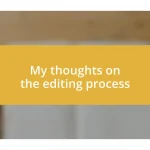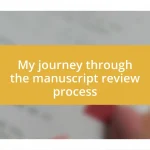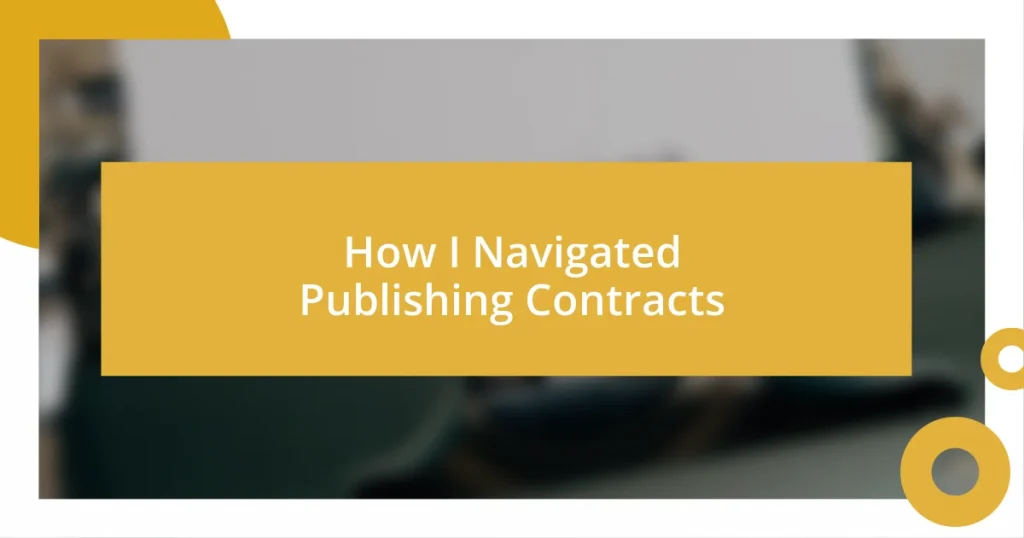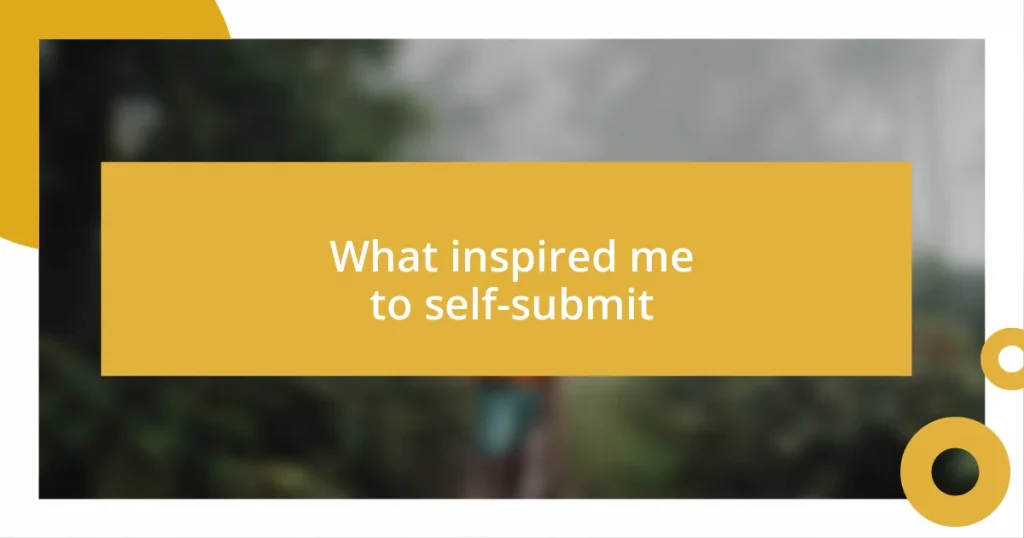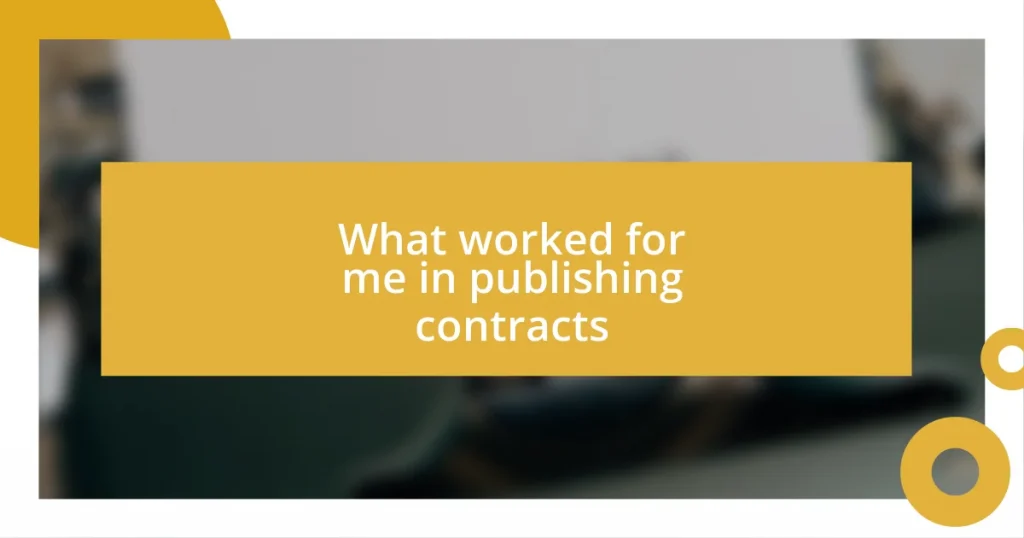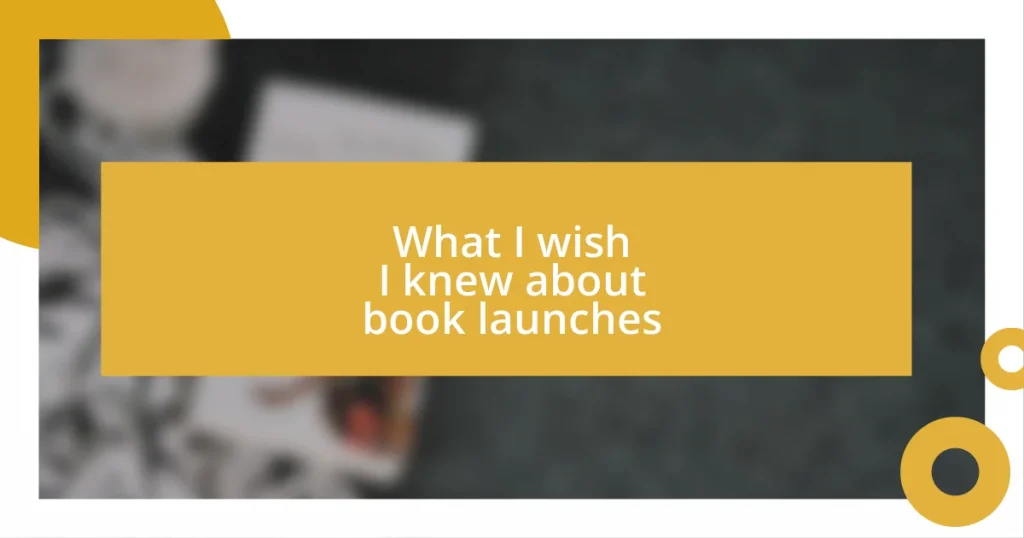Key takeaways:
- Understanding publishing contracts is essential for authors to protect their rights, with key elements such as royalties, advances, territory, termination clauses, and rights granted being crucial to grasp.
- Common misconceptions include the belief that contracts are unchangeable once signed, that all contracts are standard, and that negotiation is not possible; authors should advocate for their interests instead.
- Effective negotiation requires preparation, personal connection, and clear communication of needs, while seeking legal advice from specialized professionals can provide clarity and confidence throughout the process.
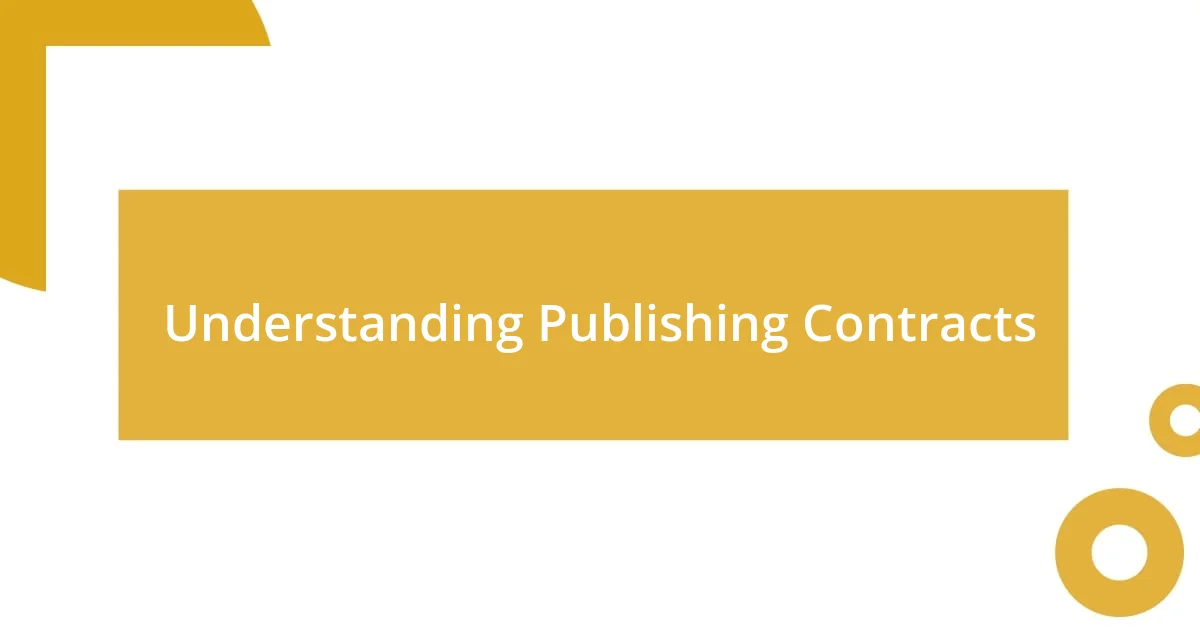
Understanding Publishing Contracts
When I first dove into the world of publishing contracts, I felt a mix of excitement and sheer anxiety. The legal jargon felt overwhelming—terms like “royalties” and “termination clauses” floated around like an indistinct haze. It genuinely made me question, what did I really know about my rights and responsibilities as an author?
I remember poring over my first contract late into the night, trying to decipher what each section meant. A friend of mine once said, “Understanding your contract is like learning a new language,” and having gone through that experience, I couldn’t agree more. So, instead of letting confusion take hold, I started highlighting key points and jotting down questions to discuss with an attorney. This proactive approach empowered me, turning what felt like a daunting task into a manageable puzzle.
One aspect that became clear was the necessity of knowing how royalties are calculated. At one point, my heart sank when I realized that not all sales would yield the same percentage. What if I sold more books than I expected, only to find out the contract had unfavorable terms? This realization reinforced the importance of not just reading but truly understanding each clause. After all, isn’t it crucial for us as writers to seize control of our own work?
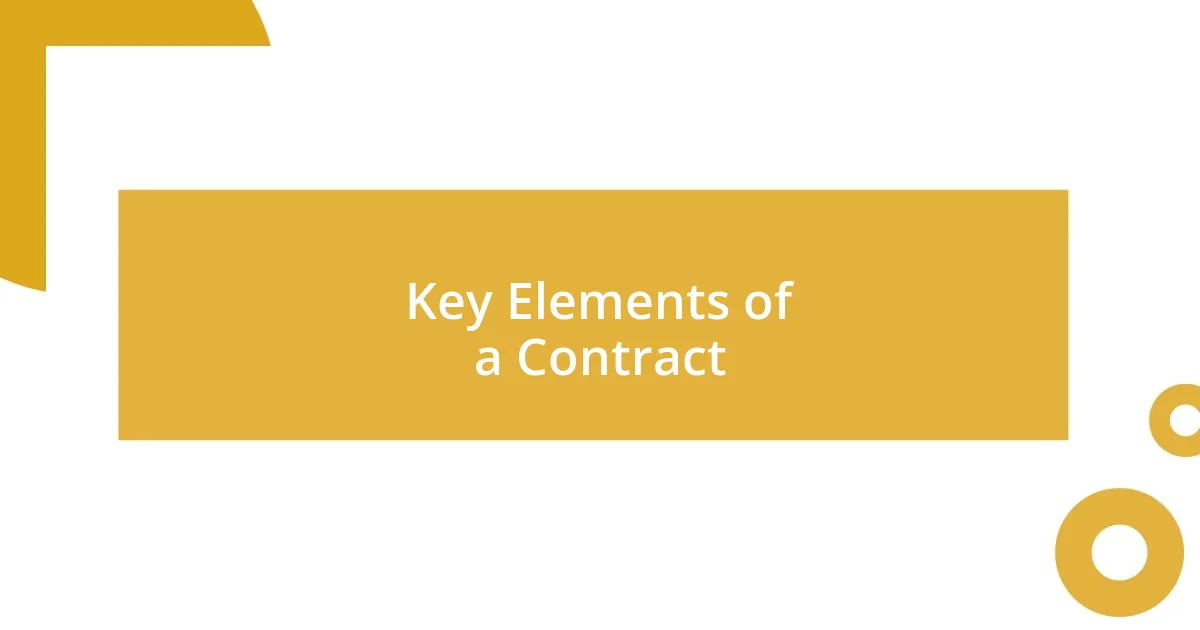
Key Elements of a Contract
When reviewing publishing contracts, I discovered that understanding the key elements can make a world of difference. Each component plays a role in protecting authors and defining our agreements with publishers. It’s crucial to pay attention to these details and not just skim through the document.
Here are some fundamental elements to focus on:
- Royalties: Understand how they are calculated, including percentage rates for different formats like e-books versus print.
- Advances: Know if you’ll receive an upfront payment and how it influences future royalties.
- Territory: Clarify where your rights apply—are you only selling in specific regions, or is it worldwide?
- Termination Clause: Determine how and when you can end the contract if necessary.
- Rights Granted: Identify which rights you are giving away, such as translation or adaptation rights, and ensure you retain what is important to you.
In my first experience with a contract, I was shocked to learn how nuanced the language could be. I found hidden terms that affected my future works in ways I hadn’t anticipated. For example, one clause gave the publisher rights to my work for a duration longer than I expected. It made me realize how essential it is to not just read the fine print, but also to ask for clarification when something doesn’t sit right with me. Asking questions turned my initial anxiety into a learning opportunity, and each interaction with my lawyer equipped me with the confidence I needed to navigate future contracts.
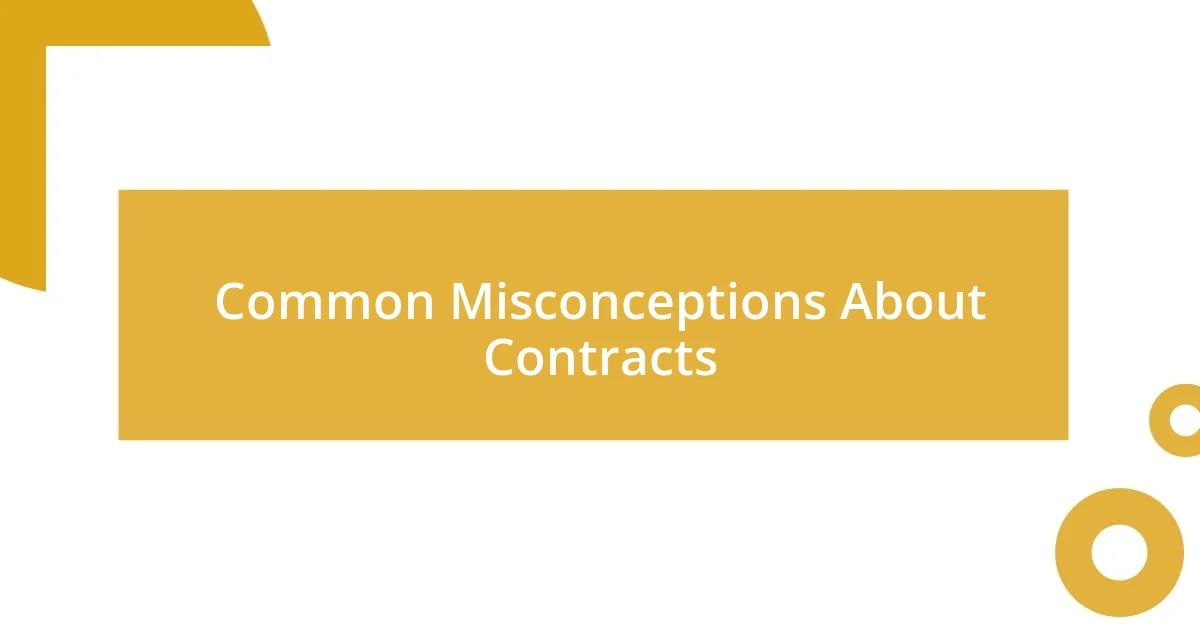
Common Misconceptions About Contracts
When I started digging deeper into publishing contracts, I often encountered misconceptions that could easily lead an author astray. One common myth is that contracts only matter when you’re signing them—many believe that once the ink dries, they can forget about the details. However, I quickly learned that a contract is a living document; I refer back to mine regularly to ensure I’m adhering to the terms and to understand how they might affect my future work. Ignoring the contract doesn’t make it go away—it only risks opening the door to misunderstandings.
Another misconception is that all contracts are standard. This really surprised me during my journey. Each agreement can vary widely and usually contains unique clauses that reflect individual negotiations. For instance, while some contracts are flexible in adapting rights for future formats, others may be quite rigid. I remember a conversation I had with a seasoned author who regretted not negotiating a better deal for her audiobook rights. That moment highlighted how vital it is to approach contracts with the understanding that my specific needs and visions might not align with typical terms.
Finally, many believe they can’t negotiate once they’ve received a contract, but I found this to be entirely untrue. Early on, I felt a bit intimidated by publishers, thinking they held all the power. But as I began to build my confidence, I realized that negotiating terms was not only possible but essential. I recall asking for clearer royalty structures—even simple changes can have a significant impact on your earnings over time. It was empowering to recognize that my voice mattered in these discussions; I wasn’t just an author, but a partner in the publishing process.
| Misconception | Reality |
|---|---|
| Contracts only matter at signing | They’re ongoing references for your rights and duties |
| All contracts are standard | Each contract can vary significantly based on negotiations |
| You can’t negotiate once you have a contract | Negotiation is a crucial part of the process |
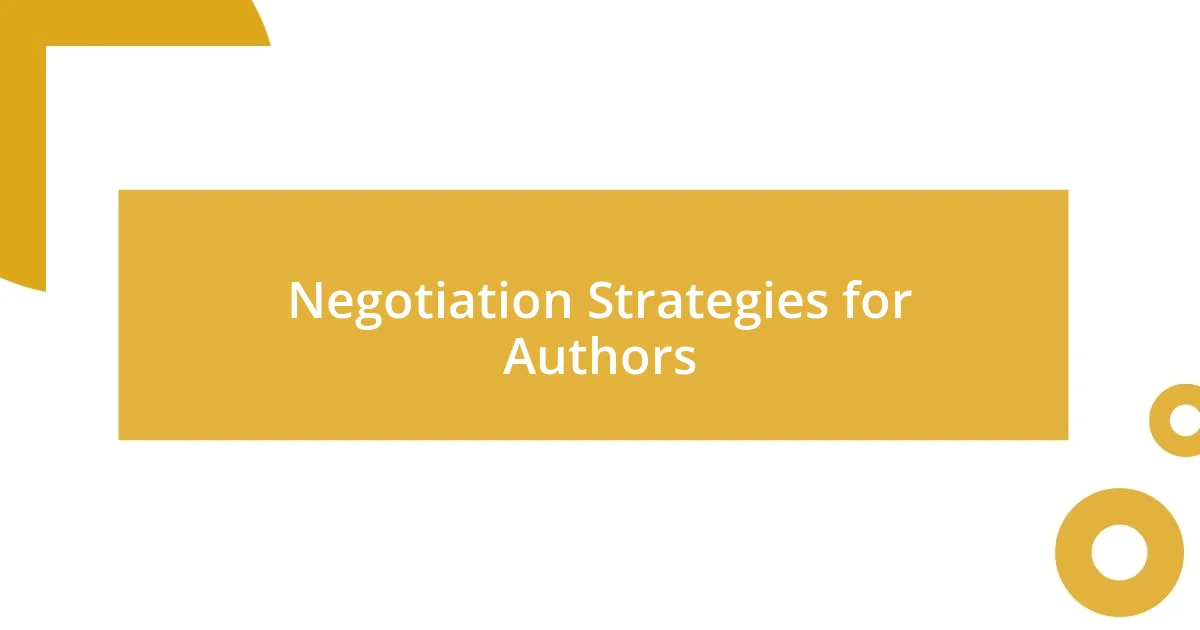
Negotiation Strategies for Authors
Negotiation can initially feel daunting, but I’ve learned that it’s really about finding common ground. The first time I entered negotiations, I felt apprehensive, doubting whether my requests were reasonable. What I discovered was that publishers appreciate authors who advocate for themselves. By articulating my needs clearly, like seeking an adjustment in the royalty rates, I fostered a more collaborative atmosphere. This lesson empowered me immensely, making every subsequent negotiation feel less like an uphill battle and more like a fulfilling exchange.
Throughout my journey, I discovered that preparation is key. Before entering discussions, I made a point to research comparable contracts and market standards. For instance, when I was negotiating my first contract, I gathered information about advances and royalties from peers in similar genres. It was eye-opening! Armed with data, I could present my case convincingly, which shifted the dynamics of the conversation. I learned that negotiation isn’t just about personal preferences; it’s about understanding the broader landscape.
Sometimes, the power of negotiation lies in creating a personal connection. There was one particular instance where I shared a heartfelt story about why a specific right was important to me—something I had omitted in previous discussions. The publisher was genuinely moved, and this connection helped us reach a compromise that felt right for both of us. It made me think: can a simple story change the course of a contract? I believe it can, and it’s essential for authors to let their authentic selves shine through during negotiations.
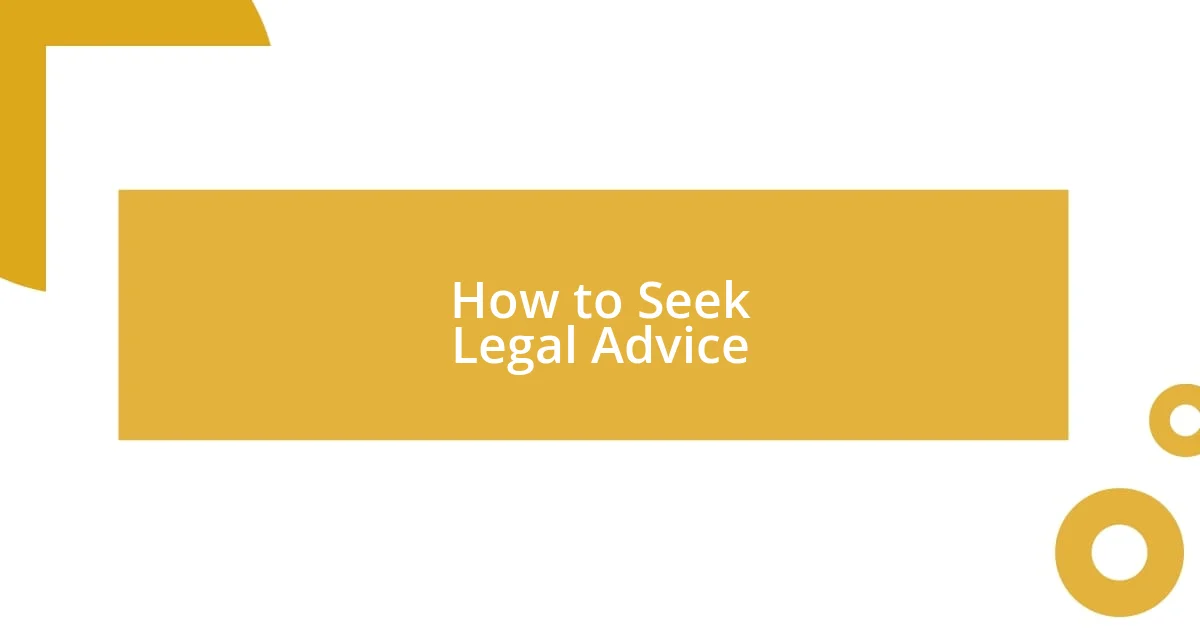
How to Seek Legal Advice
Seeking legal advice was a pivotal moment in my publishing journey. When I first considered hiring an attorney, I felt overwhelmed by the options available. I quickly learned that it’s crucial to find someone who specializes in publishing contracts—experts who understand the nuances in our industry. One of my friends recommended a lawyer she had worked with, and after a few conversations, I felt a sense of relief. Finding the right advisor can make all the difference, transforming confusion into clarity.
Once I secured legal counsel, I discovered I needed to be open and forthcoming about my goals and concerns. I remember sitting in my attorney’s office and nervously explaining my aspirations. It was impressive how quickly they grasped my needs and tailored their advice accordingly. This kind of personal connection is vital; it ensures the lawyer understands my vision, which ultimately leads to strategies that align with my creative and business goals. Have you ever left a meeting feeling more confused than when you walked in? I definitely have, but with the right guidance, that feeling dissipated.
Additionally, I found it helpful to prepare specific questions before each meeting with my lawyer. Initially, I would sit there, unsure of what to ask. But as I gained knowledge about contracts, I jotted down my thoughts and queries, like how to interpret complex clauses or what ramifications certain decisions might have. This proactive approach gave me a sense of control, allowing me to engage in meaningful dialogue and ensure that my interests were fully represented. Remember, your advocacy starts with asking the right questions. How empowering is it to understand the intricacies of your own contract? It’s an essential step toward not just signing, but thriving.
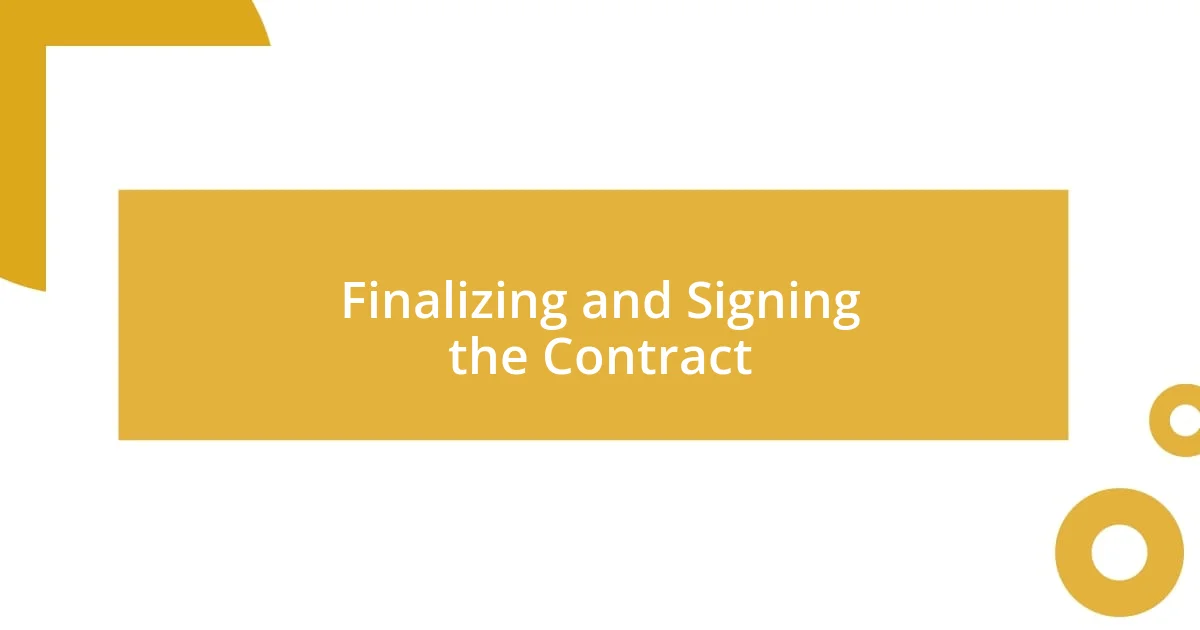
Finalizing and Signing the Contract
Finalizing a publishing contract can feel like a culmination of an incredible journey. After negotiating terms that reflect my value as an author, I remember the thrill of reviewing the final draft. It’s a moment when excitement meets apprehension. Did I cover all my bases? The reality is, I went through the document meticulously, ensuring not just my terms but also the language used was clear. I learned that clarity prevents misunderstandings down the road, which is vital in any long-term relationship.
When it came time to sign, the atmosphere was charged with anticipation. I sat at the table, the contract in front of me, and I felt a rush of emotions—anticipation, pride, and maybe a hint of fear. Will this contract truly serve my interests? I took a deep breath and reminded myself of the power I wielded by saying yes. After all the discussions and revisions, signing was my chance to seal the deal. But before putting pen to paper, I made it a point to confirm any last-minute questions with my lawyer; clarity is gold, especially at the finish line.
Finally, it’s important to reflect on the significance of that signature. It symbolizes not just a commitment, but a shared vision. The moment I signed, a wave of relief washed over me. I thought about the countless hours of work that had brought me to this point. It felt monumental, almost like standing at the edge of a new chapter. Have you felt that weight lift after finalizing an important agreement? I certainly did, knowing that I was ready to embrace this new phase of my writing career with confidence.






